AESA PROGRAMMES
- Building R&D Infrastructure
- Developing Excellence in Leadership, Training and Science in Africa (DELTAS Africa)
- Human Heredity and Health in Africa (H3Africa)
- Africa’s Scientific Priorities (ASP)
- Innovation & Entrepreneurship
- Grand Challenges Africa
- Grand Challenges Innovation Network
- Rising Research Leaders/Post-Docs
- AESA RISE Postdoctoral Fellowship Programme
- African Postdoctoral Training Initiative (APTI)
- Climate Impact Research Capacity and Leadership Enhancement (CIRCLE)
- Climate Research for Development (CR4D)
- Future Leaders – African Independent Research (FLAIR)
- Critical Gaps In Science
- Clinical Trials Community (CTC)
- Community & Public Engagement
- Mobility Schemes: Africa-India Mobility Fund
- Mobility Schemes: Science and Language Mobility Scheme Africa
- Research Management Programme in Africa (ReMPro Africa)
- Science Communication/Africa Science Desk (ASD)
- Financial Governance: Global Grant Community (GGC)
- AAS Open Research
- CARI Programmes
- Evidence Leaders Africa (ELA)
Mobility Schemes - Science and Language Mobility Scheme Africa
The Science and Language Mobility Scheme Africa was a five-year programme that funded researchers from Anglo and Francophone Africa to undertake scientific research in language regions other than their own. The programme sought to build language skills and cultural capabilities of researchers as they implemented their projects, which was a strategy towards addressing one of the barriers to intra- Africa scientific collaboration.
It was a collaboration between the African Academy of Sciences, Wellcome and Institut Pasteur providing travel grants for short term visits of up to six months to African researchers. At the AAS, the scheme was implemented through the Alliance for Accelerating Excellence in Science in Africa (AESA).
Meet the Team
The five-year programme sought to increase intra-Africa research collaboration between English and French-speaking African scientists while breaking language and cultural barriers to allow scientists to learn from each other and better address the health and development challenges facing the continent. This programme was completed.
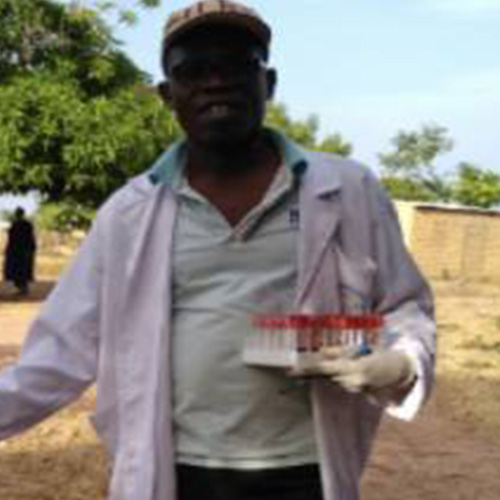 Richard Brou Yapi
Richard Brou Yapi Cote D'ivoire
Project: Capacity building in brucellosis control through the one health approach
Yapi, graduated from the University Félix Houphouët-Boigny in Côte d’Ivoire and is an associate researcher at the Lifestyles, Tropical and Emerging Disease research unit at the Centre Suisse de Recherches Scientifiques. Yapi has been active in the design, planning and execution of multidisciplinary epidemiologic cross-sectional, cohort surveys and clinical trials in rural and urban areas of Côte d’Ivoire, with emphasis on malaria and neglected tropical diseases (NTDs). Currently, he has been awarded a 3-year postdoctoral fellowship within Afrique One-ASPIRE on brucellosis control. Afrique One-ASPIRE is a DELTAS Africa funded-programme. Over the past five years, Yapi has published 14 original research articles in Thomson Reuters indexed, open-access journals with an average impact factor of 3 as lead and co-author
Project: Capacity building in brucellosis control through the one health approach
Le projet intitulé « Renforcement des capacités dans la lutte contre la brucellose par l’approche One Health » a pour objectifs général de renforcer nos connaissances sur l’épidémiologie de la brucellose afin de contribuer à la mise en place de mesures de contrôle efficaces. De façon spécifique, il s’agit de (i) renforcer nos connaissances sur la transmission de la maladie chez les animaux et de l’animal à l’homme, (ii) apprendre les techniques de diagnostic des espèces de Brucella couramment utilisées, et (iii) améliorer nos capacités linguistiques en anglais. La présente proposition sera mise en œuvre lors de notre séjour de six mois à Sokoine University of Agriculture, Morogoro en Tanzanie (SUA). Cette institution offre un plateau technique en termes de capacité de laboratoire et scientifique sur les zoonoses en général, et sur la brucellose en particulier. A la fin de notre séjour de six mois à (SUA).
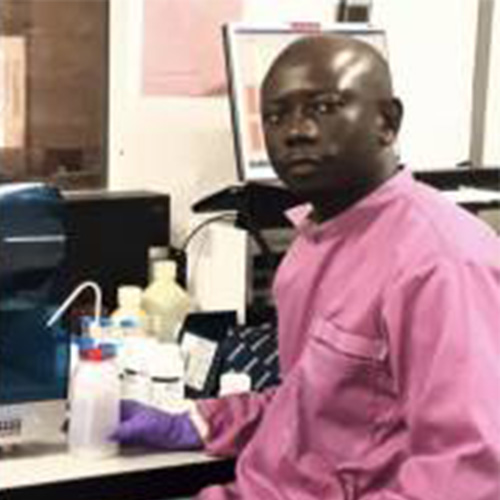 Ousmane SY
Ousmane SY Senegal
Project: Investigating population genetic structuring of Anopheles melas in Senegambia region
Ousmane SY is a medical entomologist who completed his PhD in 2015, in addition to a certificate of medical parasitology. He has a great experience in field studies by working in various research projects on malaria transmission in Senegal. His first experience in research was in 2003 during his master’s degree where he evaluated malaria indicators in different transmission settings of Senegal. Between 2008 and 2012, he was appointed as a supervisor in a seasonal malaria chemoprevention pilot project led by the department of parasitology of UCAD and the LSHTM. From 2013 to 2015, he worked as entomologist in malaria elimination project in western central Senegal, evaluating the impact of several vector control measures on hotspots areas malaria transmission. The project was funded by the Medical Research Council, the Department for International Department and Wellcome. Since 2017, he has been a researcher at MARCAD and works on genetic structure of mosquitoes involved in malaria residual transmission.
Project: Investigating population genetic structuring of Anopheles melas in Senegambia region
Anopheles melas is one the species in the Anopheles gambiae complex contributing to a local transmission of malaria in the coastal areas because of its adaptation to salty water. The main purpose of this study is to generate information on genetic structure of this species along the Senegambian costal area. This will allow us to make a good geographical classification according to the genetic profile of An.melas in Senegal. The Gambia being in the same geographical context as Senegal, this study will be extended to the Gambian coastal zone to generate additional information on this species along the West African coast. This subregional approach will contribute developing useful guidance toward a common and more effective strategies for malaria prevention and elimination based on the vector genetic diversity and susceptibility to the panel of current insecticides used in public health.
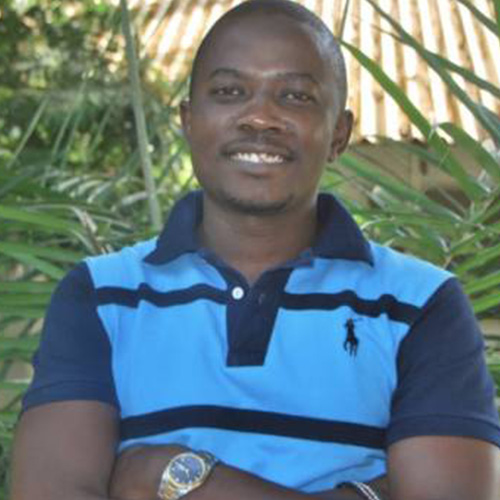 Kevin Ochieng’ Opondo
Kevin Ochieng’ Opondo Kenya
Project: Impact of insecticide resistance on malaria vector longevity and transmission potential in the wild
Opondo is a postdoctoral fellow at DELTAS Africa-funded Malaria Research Capacity Development (MARCAD) fellowship. He is based at the Disease Control and Elimination Theme at the Medical Research Council Unit The Gambia at the London School of Hygiene and Tropical Medicine. He holds a PhD in tropical medicine- entomology/epidemiology, from The University of Liverpool -Liverpool School of Tropical Medicine (LSTM) and a postgraduate diploma in planning and management of tropical disease control programmes from the Institute of Tropical Medicine, Antwerp, Belgium.
Opondo’s interest is investigating the transmission potential of insecticide resistant malaria vectors in the wild to provide empirical data to parameterize malaria transmission models. He is also interested in the application of Geographic Information System (GIS) tools to guide malaria control strategies and in simplified communication of science to policy makers, to enable evidence-based decision making.
Project: Impact of insecticide resistance on malaria vector longevity and transmission potential in the wild
Opondo is investigating how insecticide resistance in malaria vectors may impact malaria elimination goals by studying how long the resistant mosquitoes are living in the wild. While it is expected that resistant populations will live longer, laboratory data indicate otherwise. However, his preliminary data from previous work indicate that older resistant mosquitoes in the wild may still be resistant but how long they live is unknown. He is using gene expression studies to estimate how long insecticide resistant and susceptible mosquitoes in The Gambia are living. This will be important because it will help parameterize malaria transmission models specific for The Gambia to allow the National Malaria Control Programme to know exactly how their malaria elimination goals may be impacted by the development of insecticide resistance.
Part of this project will be done in Senegalese villages closer to The Gambia in collaboration with Institute Pasteur Dakar (IPD) to provide additional data on longevity of insecticide resistant malaria vectors. Opondo will spend four months at IPD in Senegal to do his project while learning French and strengthening the collaboration between his institution and IPD.
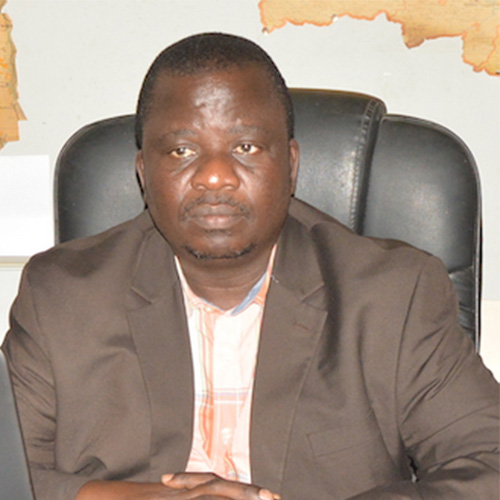 Pr. José Mangalu Mobhe Agbada
Pr. José Mangalu Mobhe Agbada Democratic Republic of the Congo
Project: Geo-Spatial mapping of cardiovascular co-mordidity in South Africa: A novel approach to assess disease burden, hotspots and resource allocation
José Mangalu Mobhe Agbada is Professor of Demography, Research Methods in Social Sciences and Humanities and Data collection Methods at l’Université de Kinshasa. He is currently Deputy-Dean in charge of Research at the Faculty of Economic Sciences. He is holder of Ph. D diploma in Demography from l’Université Catholique de Louvain (Belgium). He has been actively involved in several field researches on various themes, including health, migration, reproductive health, demographic dividend. He is also author of several scientific papers covering all these fields. In the recent past, he has received several grants for studies, researches and internships abroad. He is preparing a stay at the School of Public Health of the University of Witwatersrand in South Africa to work with Pr. Samuel MANDA and Pr. Ngianga-Bakwin Kandala on the project entitled: “Geo-Spatial mapping of cardiovascular co-mordidity in South Africa: A novel approach to assess disease burden, hotspots and resource allocation”.
Project: Geo-Spatial mapping of cardiovascular co-mordidity in South Africa: A novel approach to assess disease burden, hotspots and resource allocation
The project aims to address the challenge facing sub-saharan Africa region with the rinsing burden of lifestyle-related chronic conditions while at the same time battling with traditional and well-known infectious diseases including Tuberculosis and HIV. All these infections and civilization diseases constitute public health priorities for many Sub-saharan African countries, including South Africa and Democratic Republic of Congo. So, it is important for researchers of our region and our countries to identify the factors affecting these diseases in order to propose the relevant social economic and medical solution. The planned research will contribute to this objective. A final report and many collaborative scientific papers will be produced in margins of this project.
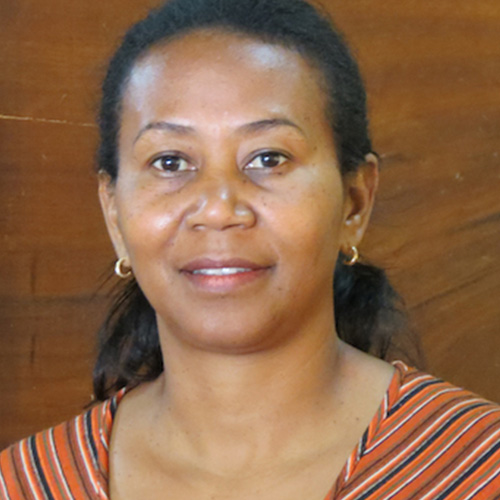 Soanandrasana Rahelinirina
Soanandrasana Rahelinirina Madagascar
Project: Fertility control experiment on rat in Madagascar: Laboratory and Field evaluations
Soanandrasana Rahelinirina is a research scientist at the Institut Pasteur de Madagascar conducting work on the surveillance and risk of zoonotic diseases, particularly those with small mammal reservoirs. She has worked as a mammalogist since 2009. She has been a principal investigator in several studies in rodent control in plague foci and surveillance of leptospirosis in rodent and livestock. The Institut Pasteur de Madagascar is an establishment of the Pasteur Institute under supervision of the Malagasy Ministry of Public Health. The four main objectives of IPM are: research activities directly applied to national health priorities; public health activities by its WHO Reference Centers; training and education essential in the Malagasy context, and service activities. Rahelinirina will visit the Africa Centre of Excellence for Innovative Rodent Pest Management and Biosensor Technology Development in Tanzania. It is the only Centre in Africa dealing with research on rodents (zoonosis, ecologically based rodent management).
Project: Fertility control experiment on rat in Madagascar: Laboratory and Field evaluations
Madagascar is the country most affected by plague. Bubonic plague transmitted by infected fleas living on rodent is the most clinical form in Madagascar. New approaches to prevent plague outbreaks are required in endemic foci areas. Currently, the available method for rodent control is the use of live traps to capture rodent. Killing rodent without using insecticide is not recommended in order to limit the risk of fleas leaving dead rodents in search of new hosts. Additional methods that could interfere with plague transmission are more than necessary to reduce the population of rats.
Fertility control is considered as a non-lethal, humane and sustainable method for managing rodent populations. Fertility control has already been tested in China and has been argued to be more humane. The Africa Centre of Excellence for Innovative Rodent Pest Management based at Sokoine University of Agriculture in Tanzania is involved in pioneering research on ecologically-based rodent pest management and innovative technologies for pest management in Africa. The centre has developed fertility bait containing two synthetic fertility hormones for management of field rats. The aim of this project is to evaluate the potential of synthetic fertility control hormones on reproduction and population reduction of black rats, Rattus rattus, to prevent bubonic plague outbreaks in humans in Madagascar.
Rahelinirina will benefit immensely from the training during 120 days at the ACE IRPM &BTD to enable her to conduct pioneering studies in Madagascar on the use of synthetic fertility hormones to control of the black rats, the major reservoir of plague in Madagascar. The purposes of the attachment are to train (1) in the preparation of bait with fertility hormones for rodent pest management (2) in histological techniques to determine the effect of fertility hormones on rodent reproductive organs (3) in techniques for sperm morphology analysis and effect of fertility hormones on sperm viability and counts (4) in techniques and protocols for laboratory experiments and field trials for establishing the effect of fertility hormones on reproduction and population dynamics of rodents.
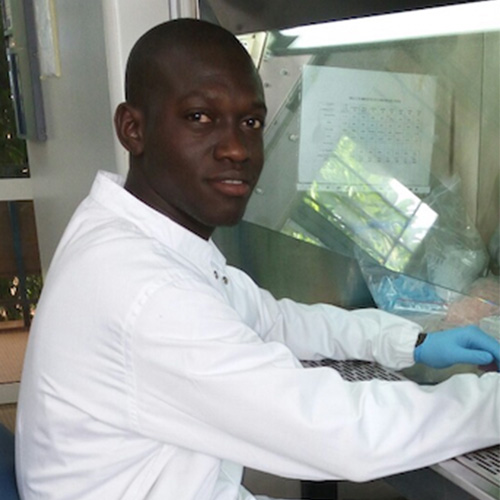 Sekou Sissoko PharmD
Sekou Sissoko PharmD Mali
Project: Plasmodium falciparum polyclonal infection dynamic Bioinformatic analysis after artemisinin treatment in Mali.
Sekou Sissoko is a young assistant researcher at MRTC who is holder of a PharmD from University of Science, Techniques and Technology of Bamako (USTTB), Mali. As part of his PharmD thesis he investigated Pf3d7_1343700 kelch propeller polymorphisms and artemisinin efficacy in Mali. He has been involved in many aspects of malaria research. He co-conducted field and laboratory studies to explore how mutation events in the genome of malaria parasites relate to the outcome of treatment and monitoring of artemisinin efficacy.
As DELGEME MSc fellow he is currently studying Bioinformatics-Biomathematics in University Cheikh Anta Diop of Dakar (UCAD). He has presented in many scientific conferences. He will visit MRC Unit The Gambia in the context of his Science and Language Mobility grant (SLM).
Project
Malaria is a major problem of public health in Africa. Artemisinin combination therapies (ACT) are the first line treatment of uncomplicated malaria in endemic countries. Spread of artemisinin resistance in Southeast Asia is a threat for malaria elimination. Sekou Sissoko will work on Plasmodium falciparum polyclonal infection dynamic Bioinformatic analysis after artemisinin treatment in Mali. During six months in MRC Unit The Gambia he will sequence around 400 samples collected during a prospective study which was conducted to evaluate the efficacy of artesunate monotherapy in Bougoula-Hameau and Faladje and analyse sequencing data using a bioinformatic tool. The field study was consisted to treat patients with uncomplicated malaria with artesunate for 7 days and followed for 28 days. Parasitaemia was evaluated every 8 hours until three consecutive slides were negative. Bougoula-Hameau is a peri-urban village which is located 5 km East of Sikasso (375 km southeast of Bamako), Faladje is a village located at 80 km northwest from Bamako. Malaria transmission is hyperendemic in the booth villages. Dry blood spot collected at four time point (H0, H8, H16, H24) will be used. Two gene targets, Pf-csp and Pf-ama1, will be selected as markers for parasite strain typing and Pf-k13, Pf-mdr1, Pf-crt will be selected because known polymorphisms of these genes confer drug resistance. So, barcoded amplicons of the genes targets will be generated by PCR multiplex which will subsequently be sequenced on Illumina MiSeq platform. This research will allow to provide insights into the role of polyclonal infection in artemisinin sensitivity.